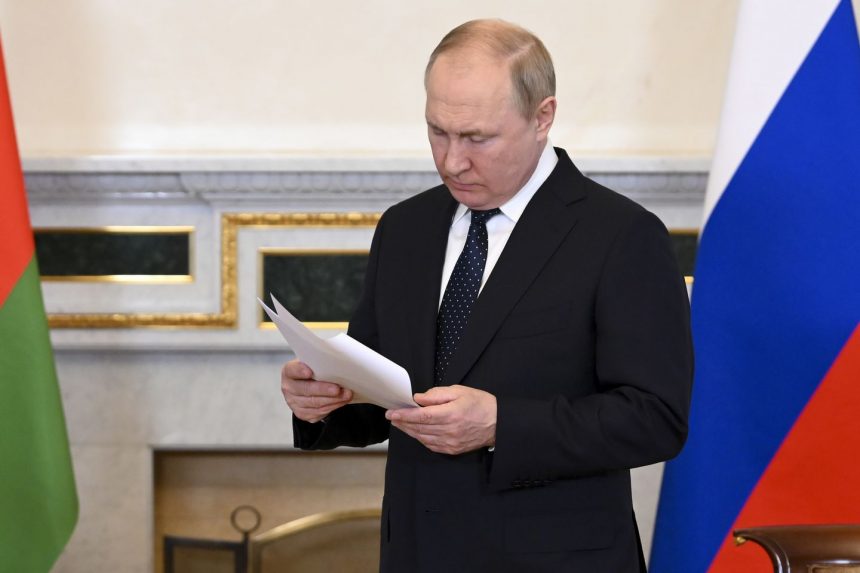Russia is poised to default on its foreign debt for the first time since the 1917 Bolshevik Revolution, further alienating the country from the global financial system following sanctions imposed over its war in Ukraine.
The country faces a Sunday night deadline to meet a 30-day grace period on interest payments originally due May 27. But it could take time to confirm a default.
“While there is a possibility that some magic could occur” and Russia gets the money through financial institutions to bondholders despite sanctions, “nobody’s making that bet,” said Jay S. Auslander, a top sovereign debt lawyer at the firm of Wilk Auslander in New York. “The overwhelming probability is they won’t be able to because no bank is going to move the money.”
Last month, the U.S. Treasury Department ended Russia‘s ability to pay its billions in debt back to international investors through American banks. In response, the Russian Finance Ministry said it would pay dollar-denominated debts in rubles and offer “the opportunity for subsequent conversion into the original currency.”
Russia calls any default artificial because it has the money to pay its debts but says sanctions have frozen its foreign currency reserves held abroad.
“There is money and there is also the readiness to pay,” Russian Finance Minister Anton Siluanov said last month. “This situation, artificially created by an unfriendly country, will not have any effect on Russians’ quality of life.”
Tim Ash, senior emerging market sovereign analyst at BlueBay Asset Management, tweeted that the default “is clearly not” beyond Russia‘s control and that sanctions are preventing it from paying its debts because it invaded Ukraine.
Here are key things to know about a Russian default:
HOW MUCH DOES RUSSIA OWE?
About $40 billion in foreign bonds, about half of that to foreigners. Before the start of the war, Russia had around $640 billion in foreign currency and gold reserves, much of which was held overseas and is now frozen.
Russia has not defaulted on its international debts since the Bolshevik Revolution more than a century ago, when the Russian Empire collapsed and the Soviet Union was created. Russia defaulted on its domestic debts in the late 1990s but was able to recover from that default with the help of international aid.
Investors have expected Russia to default for months. Insurance contracts that cover Russian debt have priced a 80% likelihood of default for weeks, and rating agencies like Standard & Poor’s and Moody’s have placed the country’s debt deep into junk territory.
HOW DO YOU KNOW IF A COUNTRY IS IN DEFAULT?
Ratings agencies can lower the rating to default or a court can decide the issue. Bondholders who have credit default swaps – contracts that act like insurance policies against default – can ask a committee of financial firm representatives to decide whether a failure to pay debt should trigger a payout, which still isn’t a formal declaration of default.
The Credit Default Determination Committee – an industry group of banks and investment funds – ruled June 7 that Russia had failed to pay required additional interest after making a payment on a bond after the April 4 due date. But the committee put off taking further action due to uncertainty over how sanctions might affect any settlement.
WHAT CAN INVESTORS DO?
The formal way to declare default is if 25% or more of bondholders say they didn’t get their money. Once that happens, provisions say all Russia’s other foreign bonds are also in default, and bondholders could then seek a court judgment to enforce payment.
In normal circumstances, investors and the defaulting government typically negotiate a settlement in which bondholders are given new bonds that are worth less but that at least give them some partial compensation.
But sanctions bar dealings with Russia’s finance ministry. And no one knows when the war will end or how much defaulted bonds could wind up being worth.
In this case, declaring default and suing “might not be the wisest choice,” Auslander said. It’s not possible to negotiate with Russia and there are so many unknowns, so creditors may decide to “hang tight for now.”
Investors who wanted out of Russian debt have probably already headed for the exits, leaving those who may have bought bonds at knocked-down prices in hopes of profiting from a settlement in the long run. And they might want to keep a low profile for a while to avoid being associated with the war.
Once a country defaults, it can be cut off from bond-market borrowing until the default is sorted out and investors regain confidence in the government’s ability and willingness to pay. But Russia has already been cut off from Western capital markets, so any return to borrowing is a long way off anyway.
The Kremlin can still borrow rubles at home, where it mostly relies on Russian banks to buy its bonds.
WHAT WOULD BE THE IMPACT OF RUSSIA‘S DEFAULT?
Western sanctions over the war have sent foreign companies fleeing from Russia and interrupted the country’s trade and financial ties with the rest of the world. Default would be one more symptom of that isolation and disruption.
Investment analysts are cautiously reckoning that a Russia default would not have the kind of impact on global financial markets and institutions that came from an earlier default in 1998. Back then, Russia’s default on domestic ruble bonds led the U.S. government to step in and get banks to bail out Long-Term Capital Management, a large U.S. hedge fund whose collapse, it was feared, could have shaken the wider financial and banking system.
Holders of the bonds – for instance, funds that invest in emerging market bonds – could take serious losses. Russia, however, played only a small role in emerging market bond indexes, limiting the losses to fund investors.
While the war itself is having devastating consequences in terms of human suffering and higher food and energy prices worldwide, default on government bonds would be “definitely not systemically relevant,” International Monetary Fund Managing Director Kristalina Georgieva has said.
Copyright © 2022 The Washington Times, LLC.
READ NEWS SOURCE
The post What's the impact of a Russian debt default? appeared first on thewashingtondigest.com.





